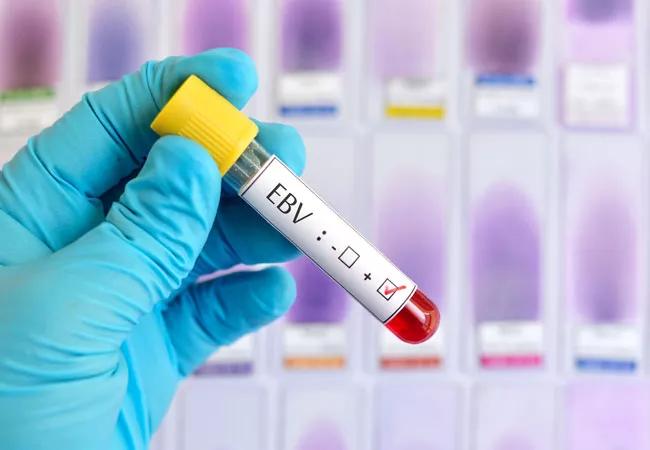Be careful not to overinterpret a recent important study

A recent study in Science (2022;375:296-301) finding a link between Epstein-Barr virus (EBV) and development of multiple sclerosis (MS) is a major step forward. However, it has been overinterpreted by some to imply that the virus “causes and perpetuates” the chronic inflammatory demyelinating condition, says Robert Fox, MD, staff neurologist with Cleveland Clinic’s Mellen Center for Multiple Sclerosis Treatment and Research.
Advertisement
Cleveland Clinic is a non-profit academic medical center. Advertising on our site helps support our mission. We do not endorse non-Cleveland Clinic products or services. Policy
The study, based on blood sample data collected from more than 10 million young adults on active duty in the U.S. military, found that the risk for MS increased 32-fold after infection with EBV but was not increased after infection with other similar viruses.
The findings were widely reported with headlines using the words “cause” and “causality” to describe the role of EBV in the development of MS. The authors themselves — led by Alberto Ascherio, MD, of the Harvard T. Chan School of Public Health — say that their data suggest EBV to be “the leading cause of MS.”
But Dr. Fox says that’s somewhat misleading, given that over 95% of all adults have been infected with EBV while MS affects only about 0.1% to 0.2% of adults. Indeed, the researchers’ preliminary data had shown that just 5.3% of the military’s stored samples from adults — most of them younger than 20 years at first blood collection — were EBV-negative.
The study followed 801 recruits who subsequently developed MS and matched them with 1,566 controls who didn’t develop MS. Only one of the 801 MS cases occurred in an individual who had been EBV-negative at the last blood sample. Although 97% of those who developed MS had seroconverted from EBV negative to EBV-positive status before the MS diagnosis, 57% of the controls who did not develop MS also seroconverted.
“We have long suspected that EBV is an important trigger for MS, but it is a highly nonspecific trigger,” says Dr. Fox, who also serves as Vice Chair for Research in Cleveland Clinic’s Neurological Institute. “That EBV seroconversion was seen in almost all new cases suggests that EBV is essentially required to develop MS and is surely part of the developing MS pathway, but it is clearly not sufficient.” He also points out that the role of EBV in perpetuating the inflammation in MS patients is unknown.
Advertisement
Dr. Fox is concerned that some patients who have nonspecific neurologic symptoms that aren’t MS might read about the study and ask to be tested for EBV — and, if positive, will assume the positive EBV test proves that they have MS. “MS is a clinical diagnosis based on history, neurologic exam and additional studies, including MRI,” he says. “EBV should not be used as a test for MS because the vast majority of the population will test positive for EBV. But I worry that’s where this may go.”
On the other hand, the findings do point to the possibility that the development of MS could be prevented with early antiviral treatment, or that a future EBV vaccine could be given to young children before they have a chance to become infected. That prospect, raised in an editorial accompanying the paper in Science, is an interesting idea but would need extensive efficacy and safety investigation, Dr. Fox says.
One aspect of MS that this study did not address is the role of EBV in the progressive form of the disease, which develops over time in about half of people initially diagnosed with relapsing-remitting MS. A smaller proportion, about 15% of MS patients, develop primary progressive disease, but they are usually older. The vast majority of these young military recruits would certainly have had the relapsing-remitting type, Dr. Fox notes.
“We have many effective treatments for relapsing-remitting MS,” he says. “The huge unmet need is treatments for progressive MS. Researchers are currently exploring whether progressive MS may be driven by EBV activity or EBV-related immune responses. This paper adds nothing in support of that.”
Advertisement
Despite all the caveats, Dr. Fox believes the study was well conducted and adds a great deal to the knowledge base since it is a rare study that had access to before-and-after blood samples. “This is a beautifully characterized population and therefore is a powerful setting in which to test theories about how MS is triggered,” he says.
Advertisement
Advertisement

Aim is for use with clinician oversight to make screening safer and more efficient

Rapid innovation is shaping the deep brain stimulation landscape

Study shows short-term behavioral training can yield objective and subjective gains

How we’re efficiently educating patients and care partners about treatment goals, logistics, risks and benefits

An expert’s take on evolving challenges, treatments and responsibilities through early adulthood

Comorbidities and medical complexity underlie far more deaths than SUDEP does

Novel Cleveland Clinic project is fueled by a $1 million NIH grant

Tool helps patients understand when to ask for help